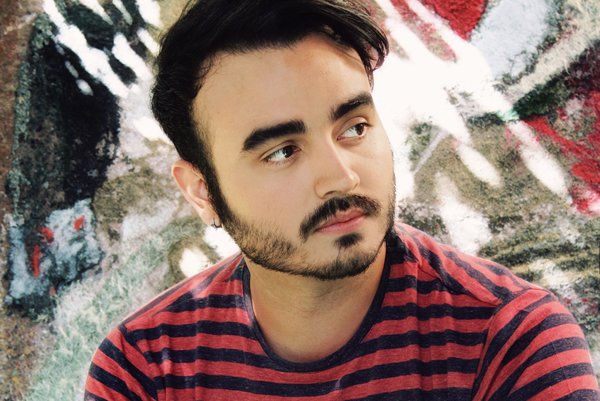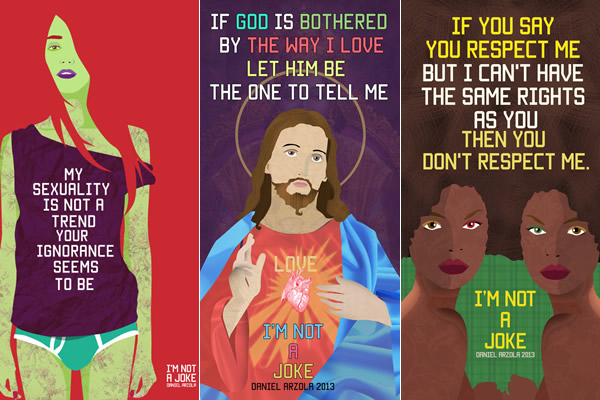Arts & Entertainment
Gay Venezuelan ‘artivist’ fights homophobia, discrimination
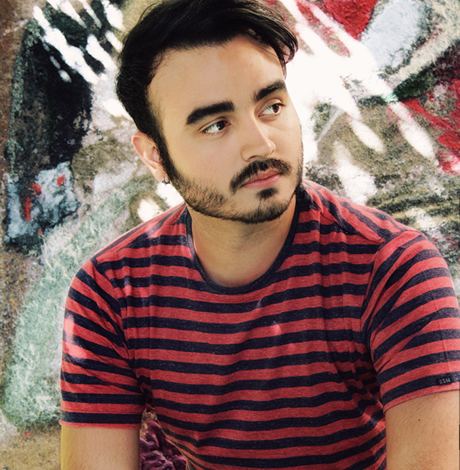
Daniel Arzola is behind the “I’m Not a Joke” campaign, which features a series of 50 posters that contain a sentence and a digital illustration.
The campaign — known as “No soy tu chiste” in Spanish — has appeared in the U.S., Venezuela, Brazil, Australia, Uganda, Russia and two dozen other countries around the world. Arzola’s posters have also been translated into English, Portuguese and 18 other languages.
“It’s about being different,” Arzola told the Washington Blade on April 14 during an interview at Amherst College where an LGBT student group had invited him to speak.
Katy Perry selected several of Arzola’s posters for Madonna’s Art for Freedom, a project for which she is a guest curator.
Arzola told the Blade that his life changed when Madonna tweeted a picture of one of them on Oct. 8, 2013.
“At that moment ‘I’m Not a Joke’ was not only for activists,” said Arzola. “I received a lot of interview (requests) from a lot of countries. And the people from Venezuela who hate me knew my work because Madonna made that tweet.”
“It’s a little cliché but Madonna changed my life,” he added.
‘They tried to burn me alive’
Arzola, 26, grew up in Maracay, a city that is roughly 70 miles south southwest of the Venezuelan capital of Caracas.
Arzola, who has an older brother, told the Blade that he was a “very shy” and “lonely” child. He said that he used “art to communicate with other people.”
“If I liked you, I preferred to give you (a drawing) than to talk to you,” said Arzola.
Arzola said he came out to his mother when he was 5, telling her that he liked a boy in his kindergarten class.
“I told her and she beat me,” said Arzola.
Arzola told the Blade that his mother, who is a teacher, is “not homophobic anymore.” He said she now wears a t-shirt that promotes his art in her classroom.
“She’s like my biggest fan all the time,” said Arzola.
Arzola said that three of his neighbors attacked him when he was 15.
He told the Blade that they took off his pants and shoes before tying him to a telephone poll with cables. Arzola said he was able to escape when one of his attackers tried to find gasoline to set him on fire.
He told the Blade that his assailants destroyed all of his drawings.
“They tried to burn me alive because that’s the way that some people in Venezuela react to the differences in another person,” Arzola told the Blade. “It’s not only if you’re gay.”
Arzola said he was unable to draw for the next six years “until one day I understood that my story is not the only story and I had the luck to escape and survive.” He told the Blade that an 18-year-old man from Maracay who was attacked because of his sexual orientation suffered burns over nearly 50 percent of his body.
“There’s a lot of people burning people alive or hurting other people in Venezuela for being gay,” said Arzola.
The U.N. Office on Drugs and Crime notes that Venezuela has one of the world’s highest homicide rates. A deepening economic crisis has caused a shortage of basic goods, triple-digit inflation and growing political and social instability.
Tamara Adrián, a Caracas lawyer who is a member of Popular Will, a left-leaning party, in December became the first openly trans person elected to the Venezuelan National Assembly. Anti-LGBT violence and discrimination remains pervasive in the South American country in spite of this historic election.
Arzola, who studied graphic design and art in Venezuela, told the Blade that he wanted to use art as a way to challenge anti-gay violence and homophobia in his homeland.
“This is the way that artivism burns in my head,” he said. “I need to fight violence with other things and in Venezuela being gay is always in the media. People laugh about being LGBT, so I was wondering (about) when we start to laugh about tragedy, about the pain of others. In Venezuela people are always saying that, ‘We’re so cool because we find a joke in everything.’ But that everything sometimes includes the pain of others.”
“That’s where the name ‘I’m Not a Joke’” comes in,” added Arzola. “I want to talk with people like you and me, so I’m not your joke. I’m not a joke.”
Threats forced Arzola to move to Chile
Arzola told the Blade that he began to receive threats because of his art and advocacy.
“I had to leave Venezuela because of threats,” he said. “When ‘I’m Not a Joke’ started to be so famous I had the opportunity to talk to so many media, so I exposed the government and the homophobia in Venezuela.”
Arzola met Jaime Parada — a Chilean LGBT rights advocate who became the first out candidate elected to public office in the South American country in 2012 when he won a seat on the Providencia Municipal Council in Santiago — in 2014 during a trip to Buenos Aires.
Arzola moved to Santiago, which is the Chilean capital, in April 2015. He now lives in Providencia — a wealthy Santiago enclave — and works for the municipal government.
“I like Santiago,” Arzola told the Blade. “It’s the first time in my life I have experienced peace…and for me it’s something new. For me it’s very weird being in my bed without fear.”
“For me coming from the chaos in Venezuela and being in Providencia is like, ‘Oh yeah. I create all the time with chaos and now I am in peace. I’m like, what should I do now?’” he added. “I don’t know what to do with so much peace. I’m still creating.”
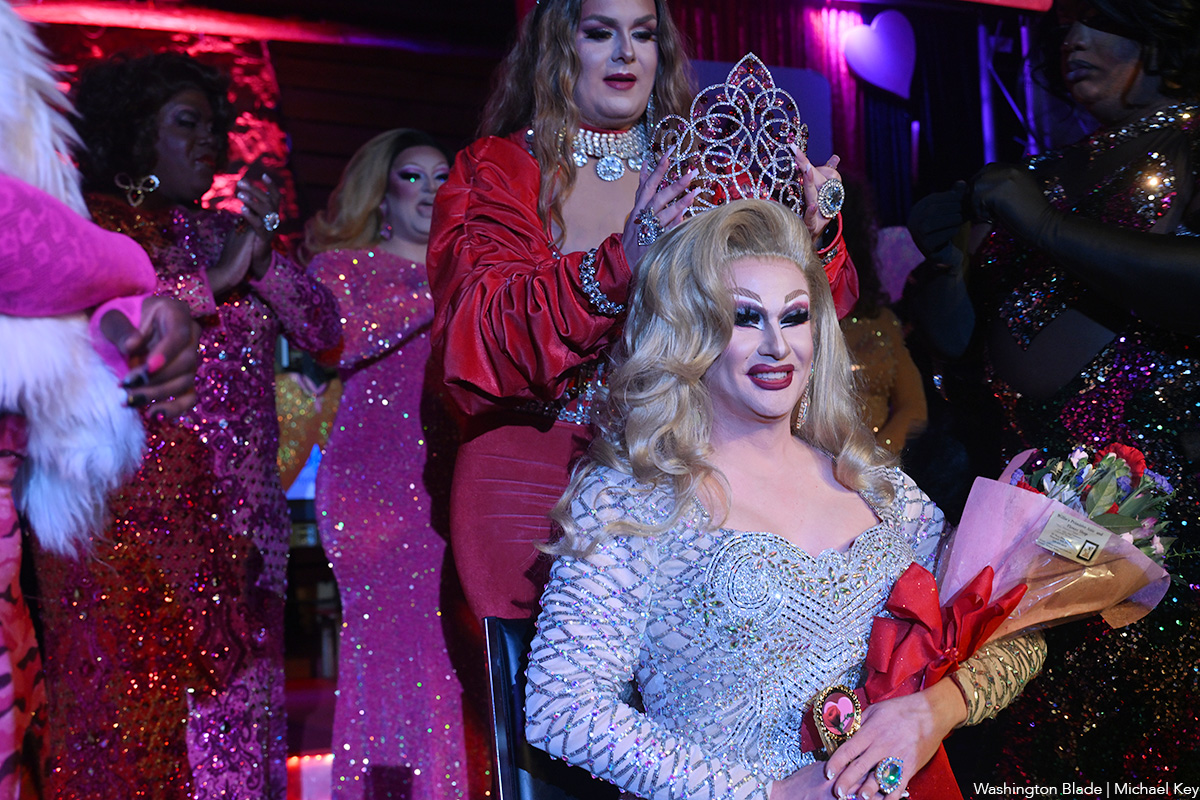
The 44th annual Queen of Hearts pageant was held at The Lodge in Boonsboro, Md. on Friday, Feb. 20. Six contestants vied for the title and Bev was crowned the winner.
(Washington Blade photos by Michael Key)
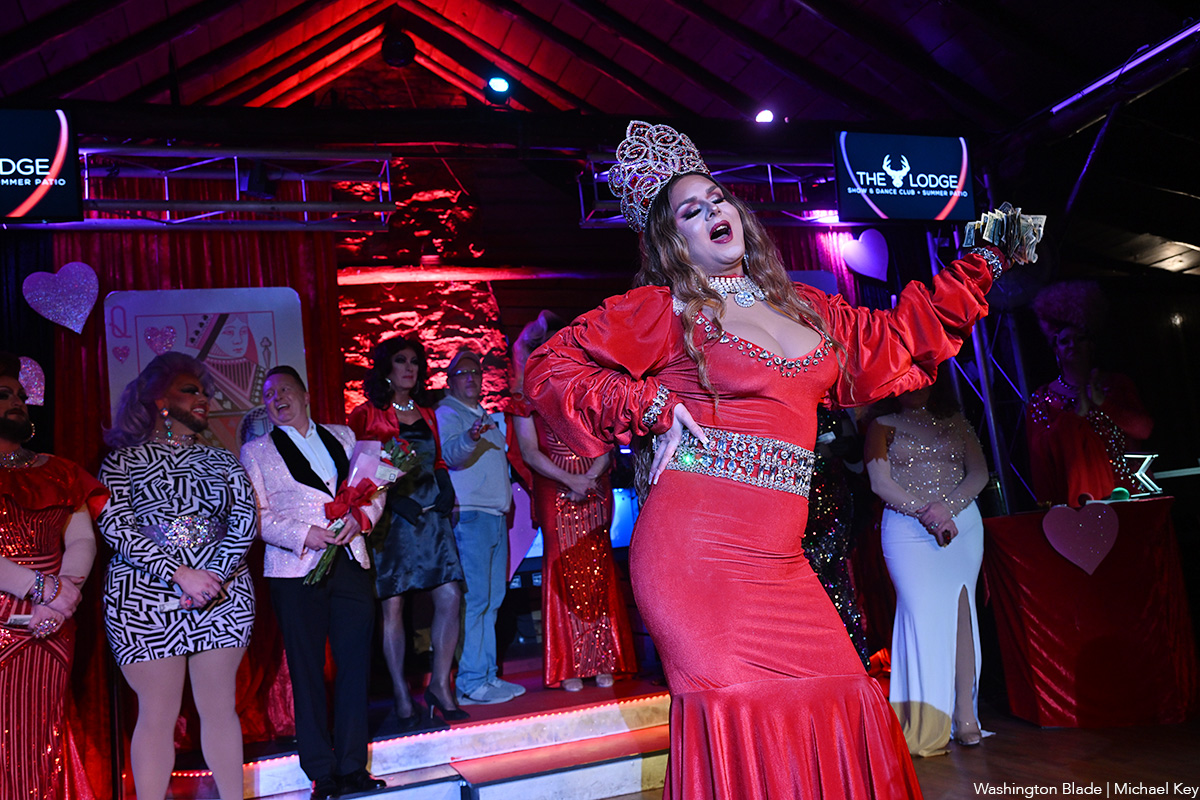
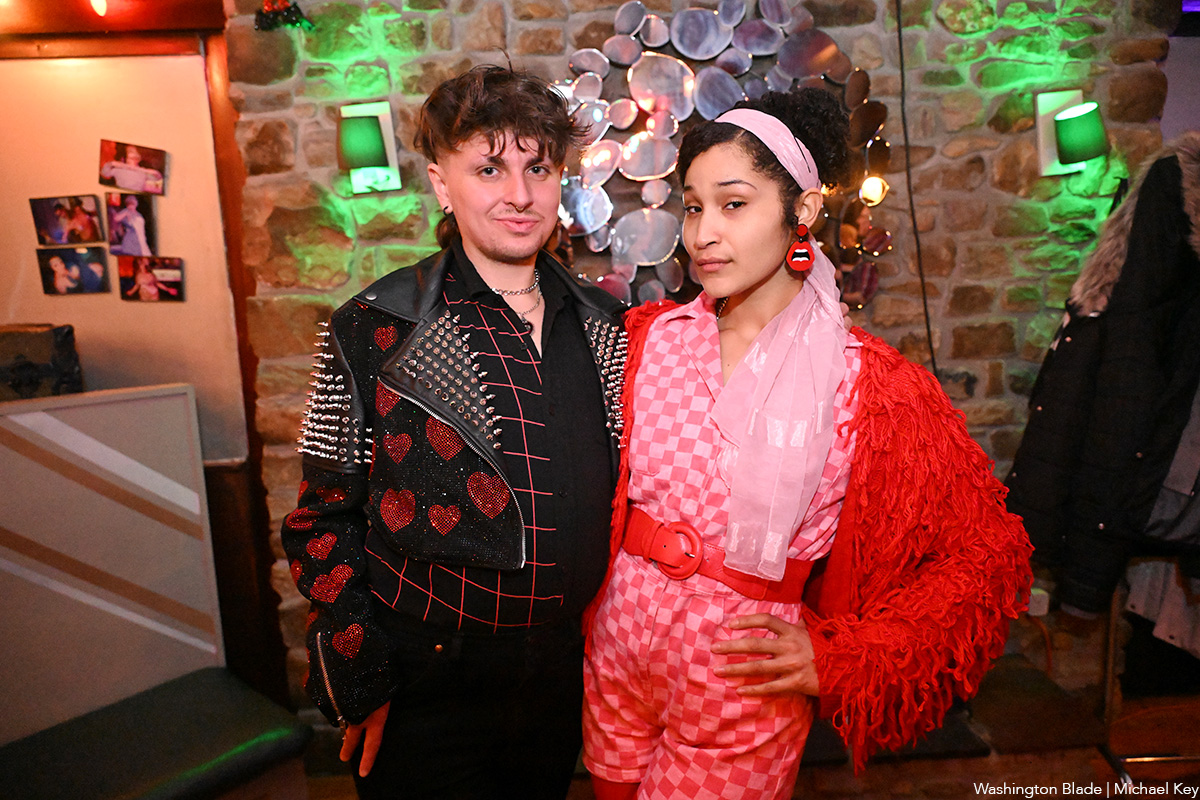
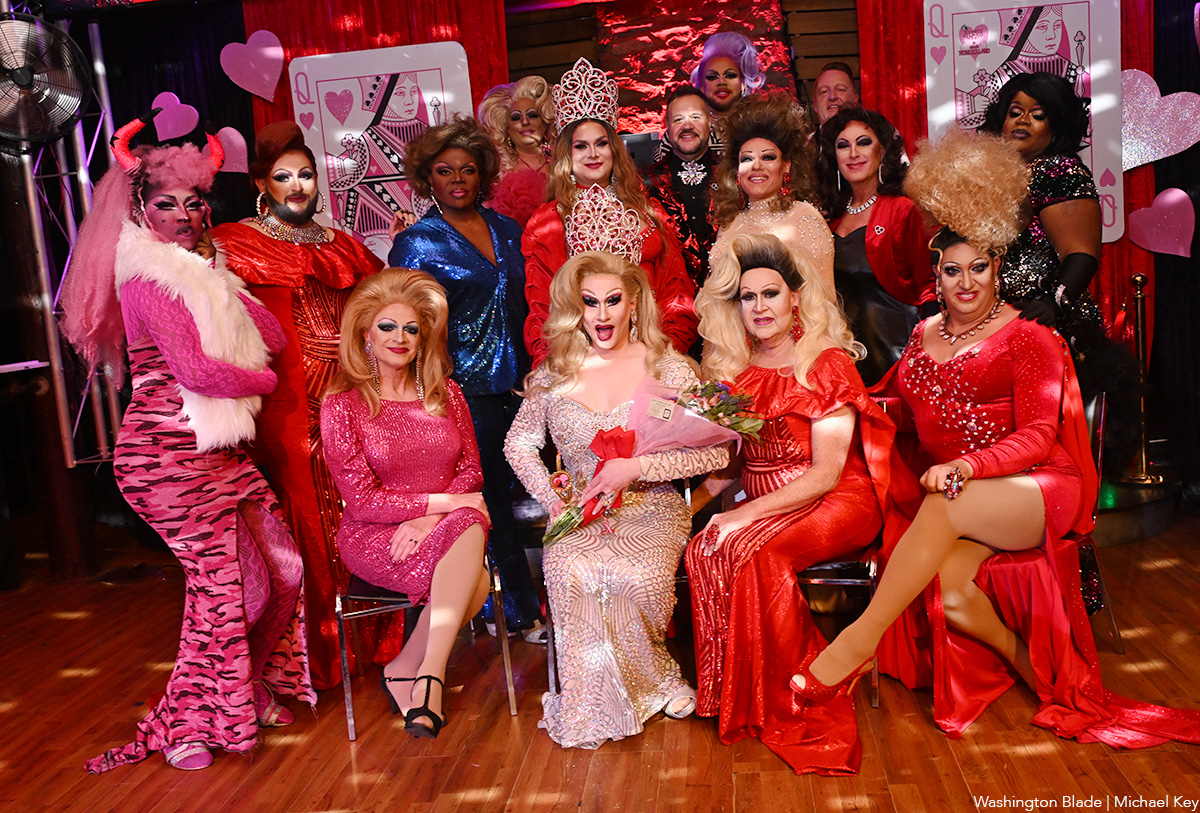
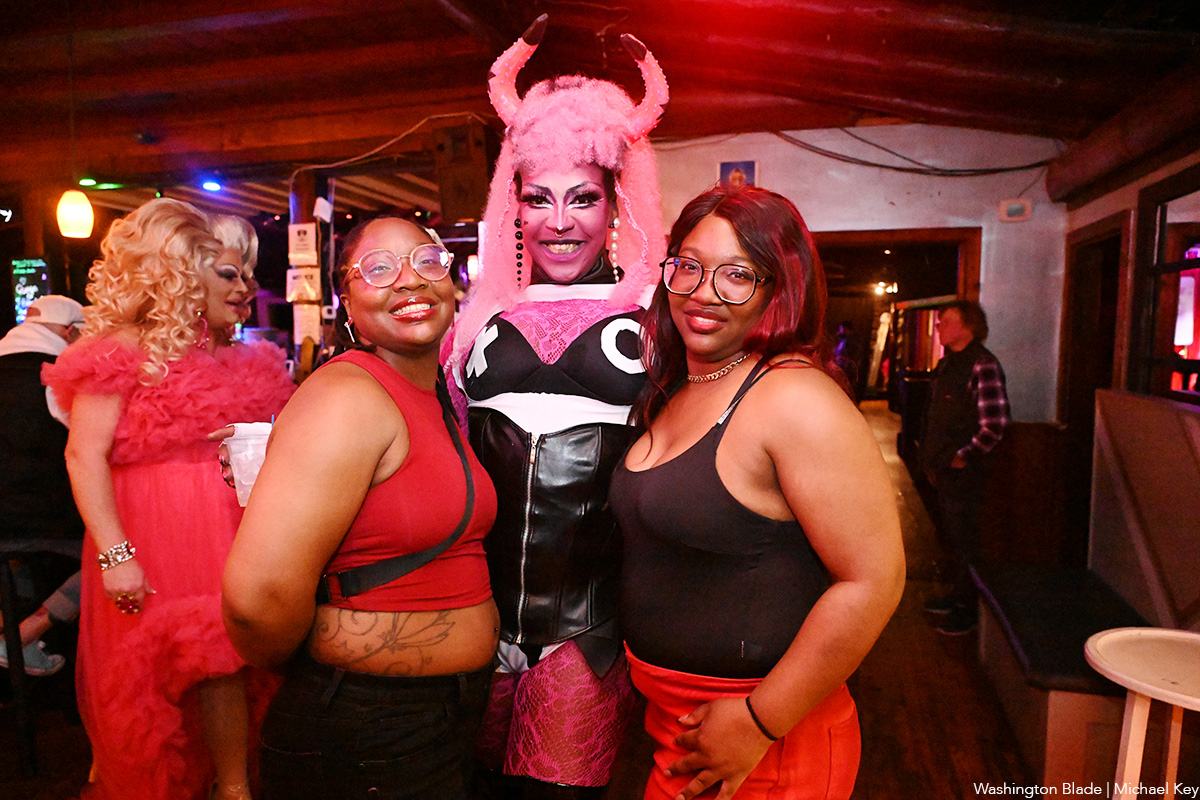
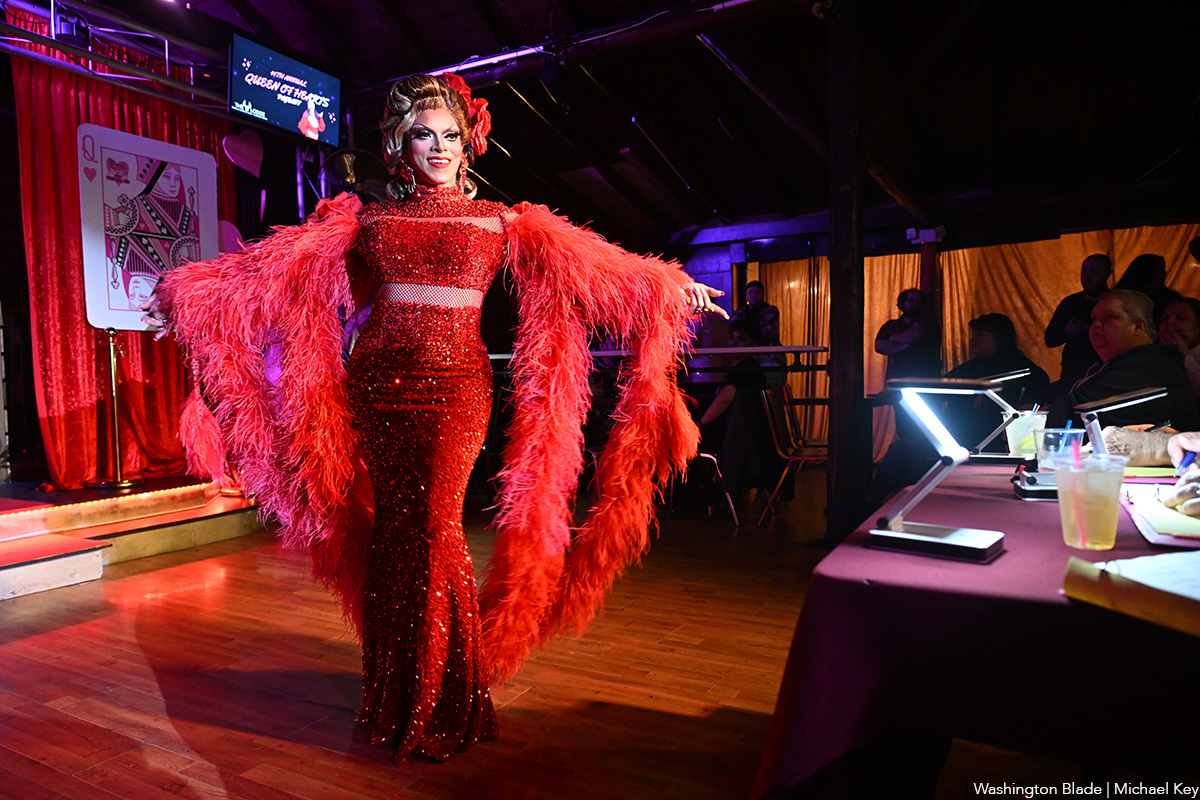
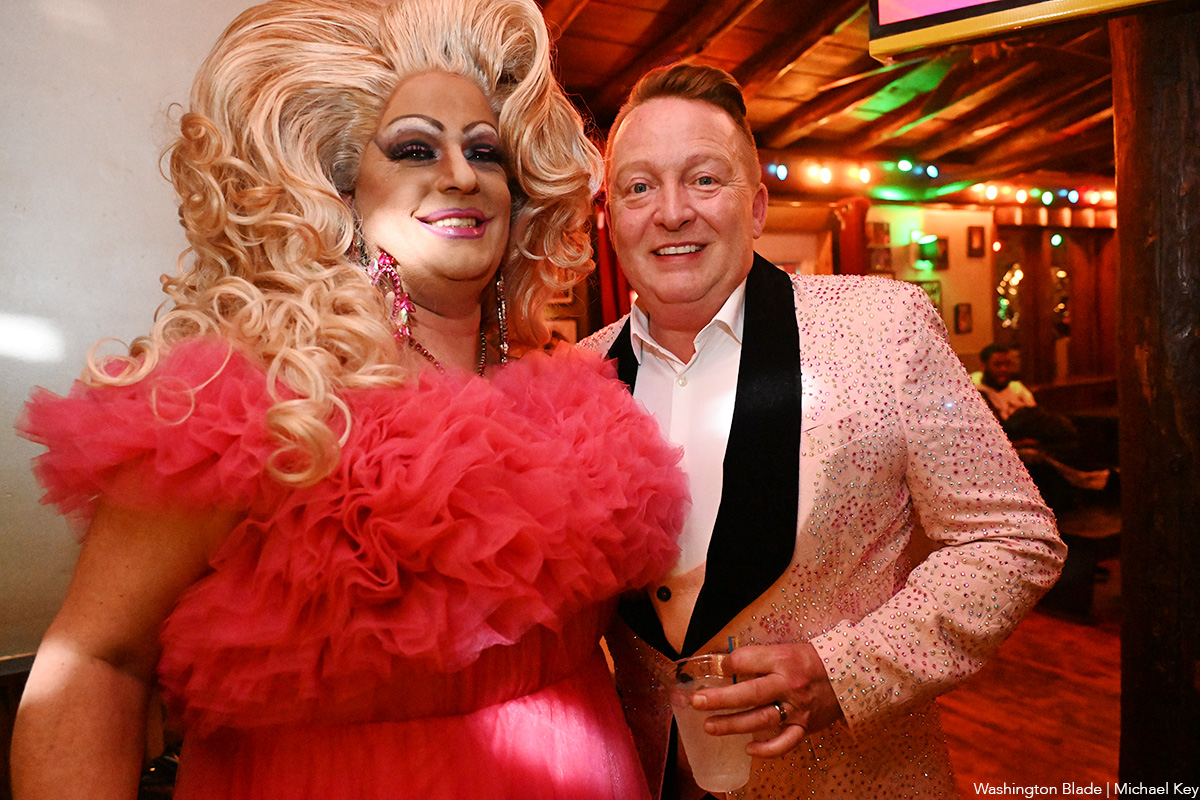
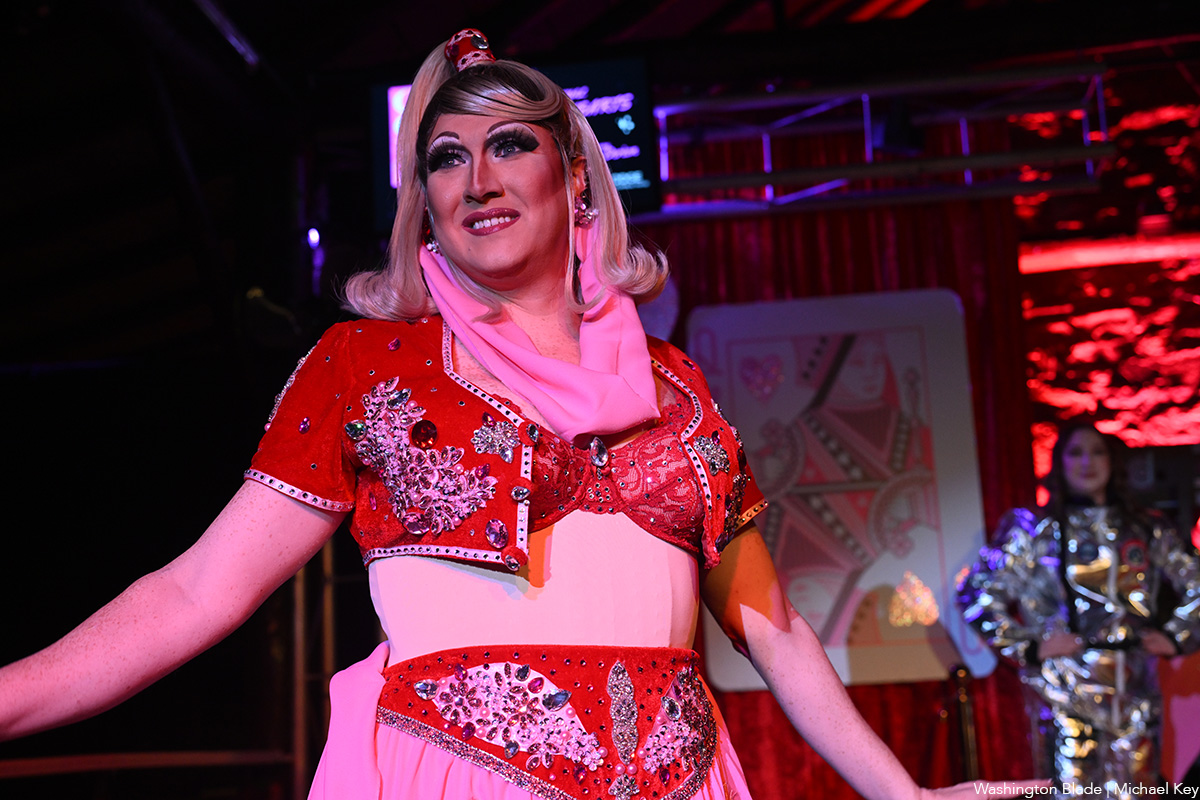
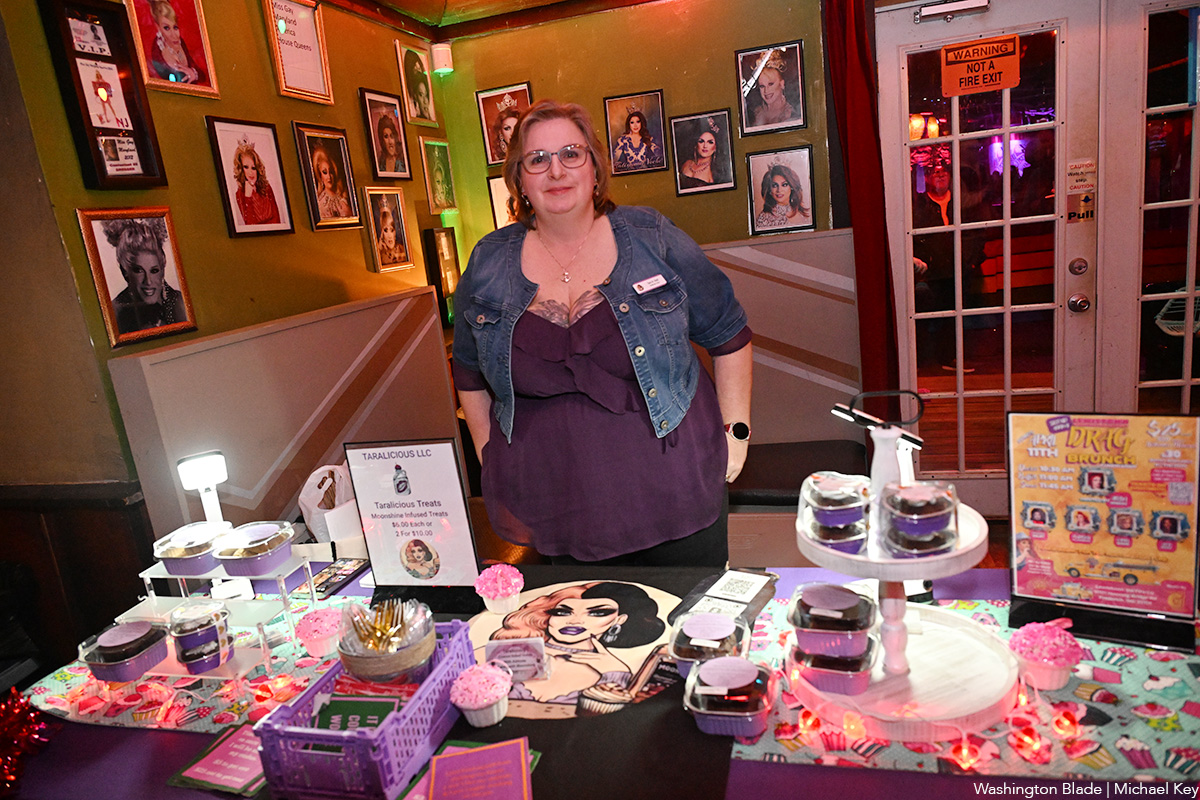
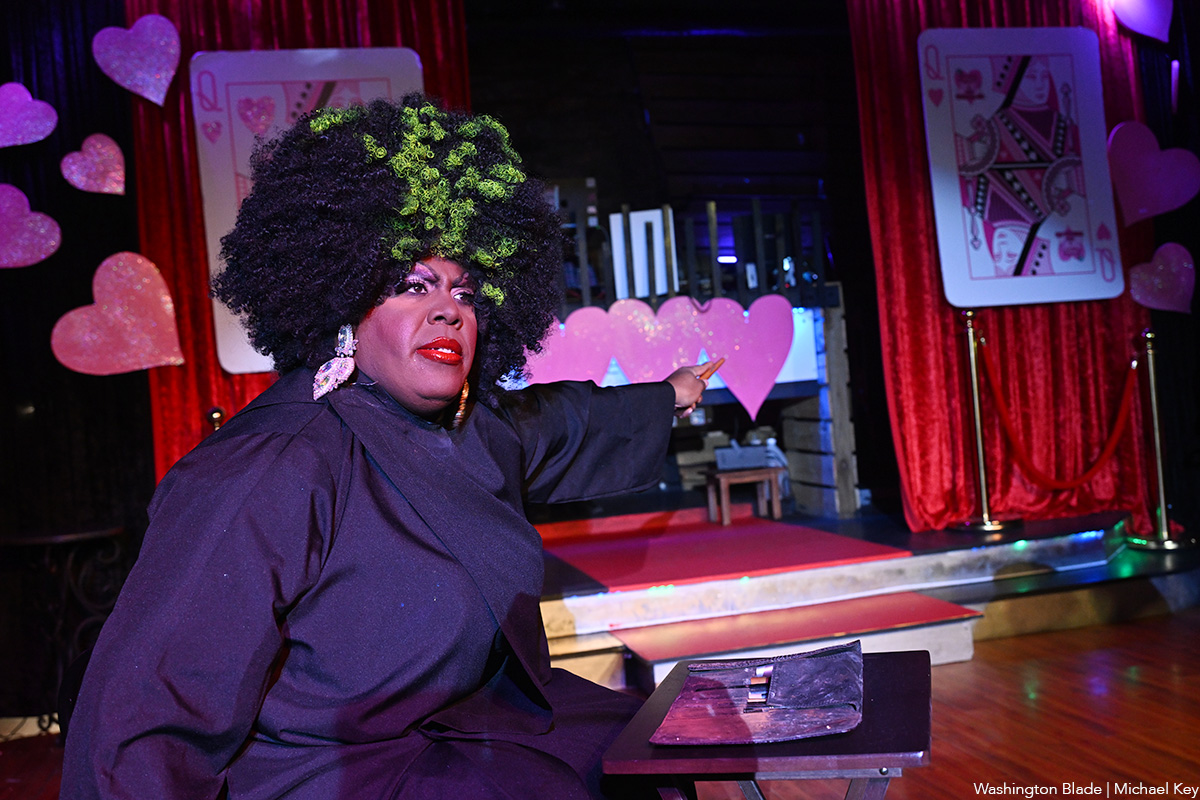
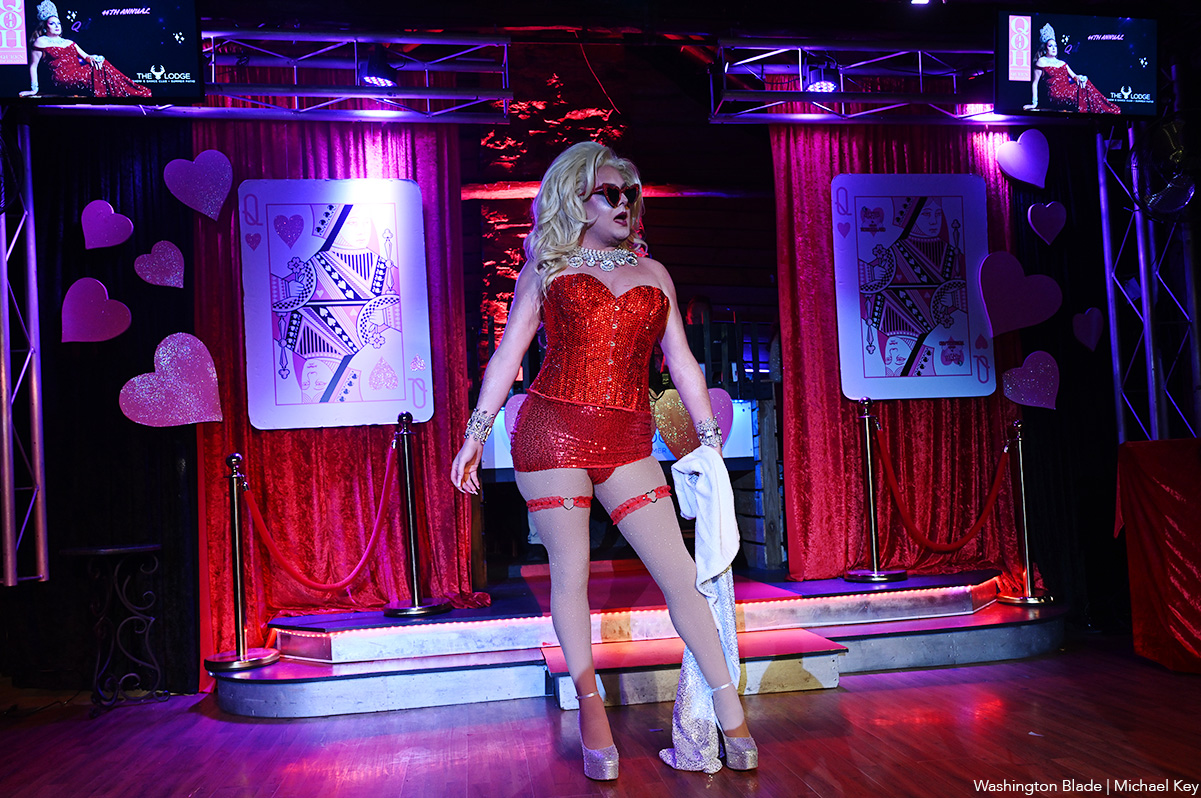
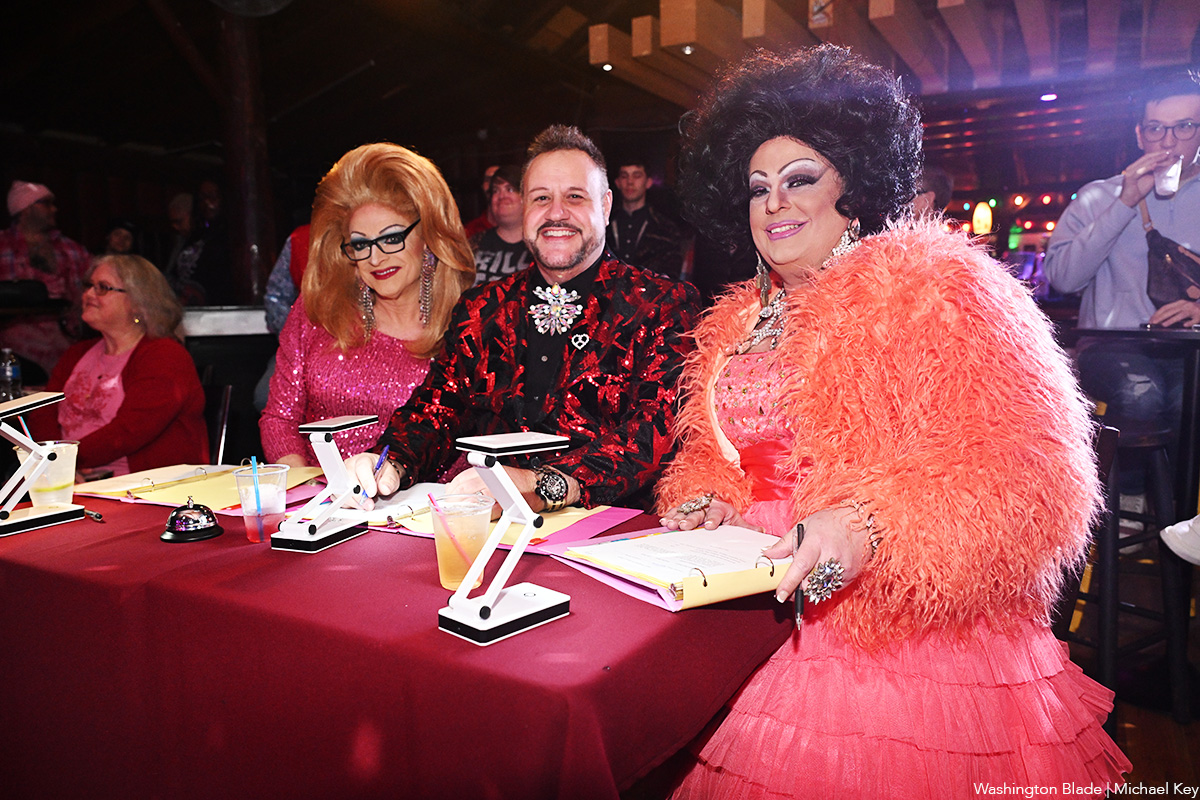
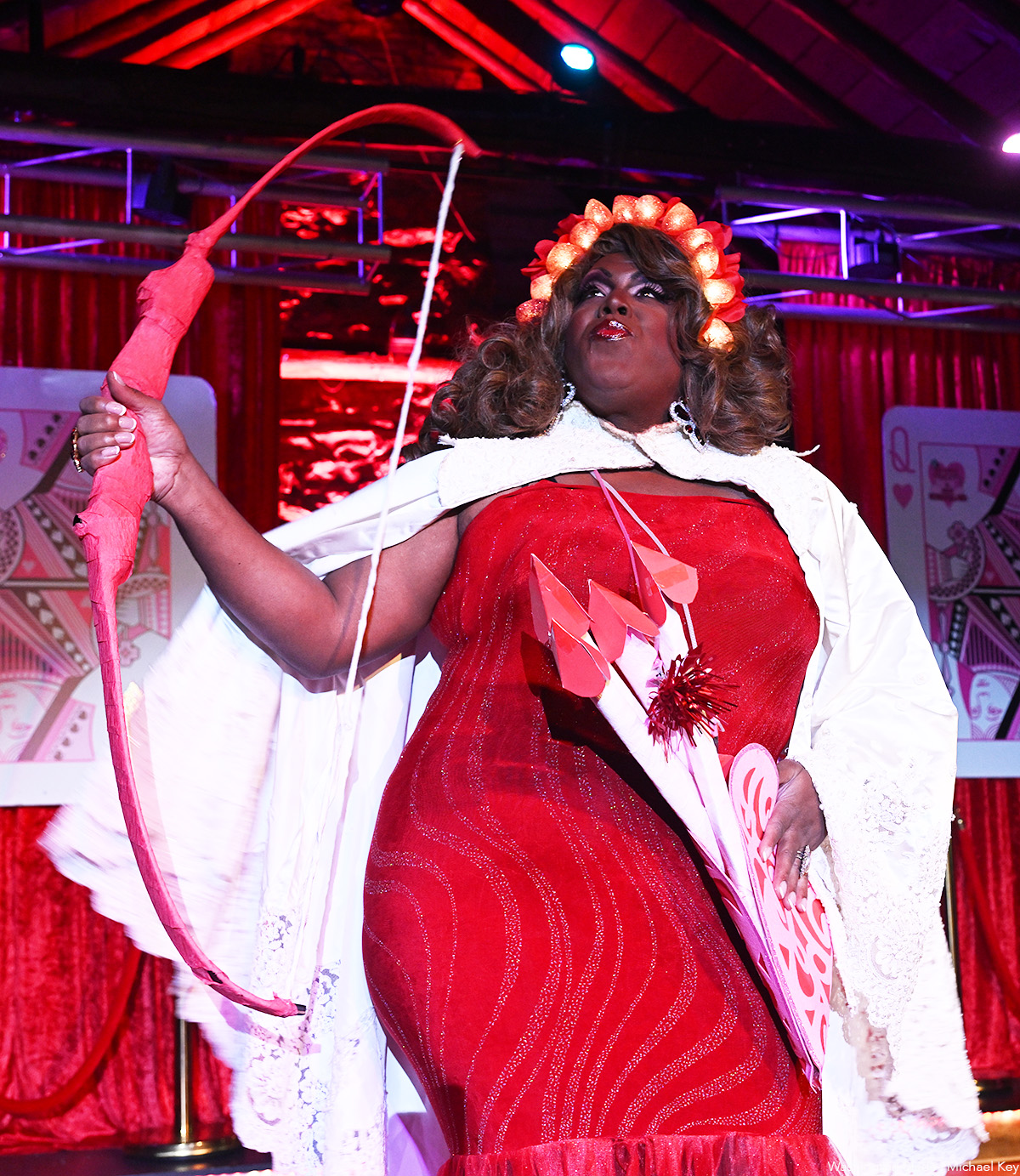
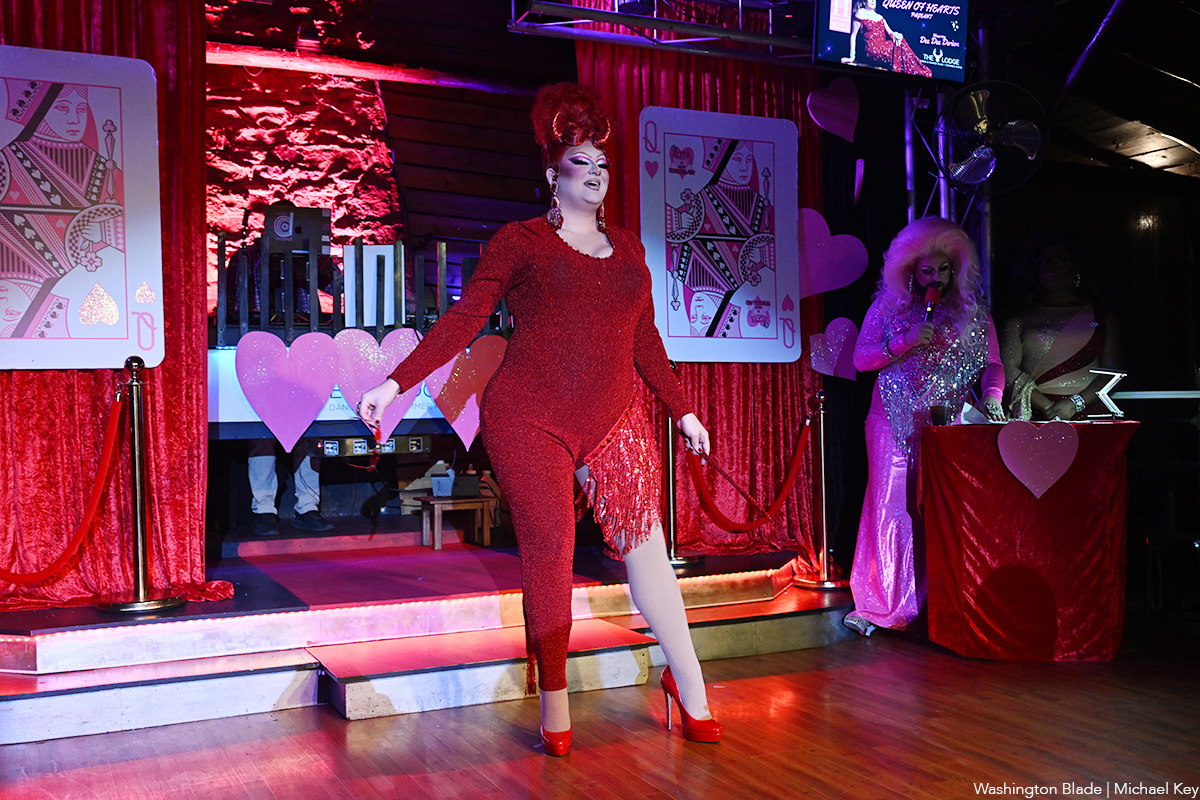
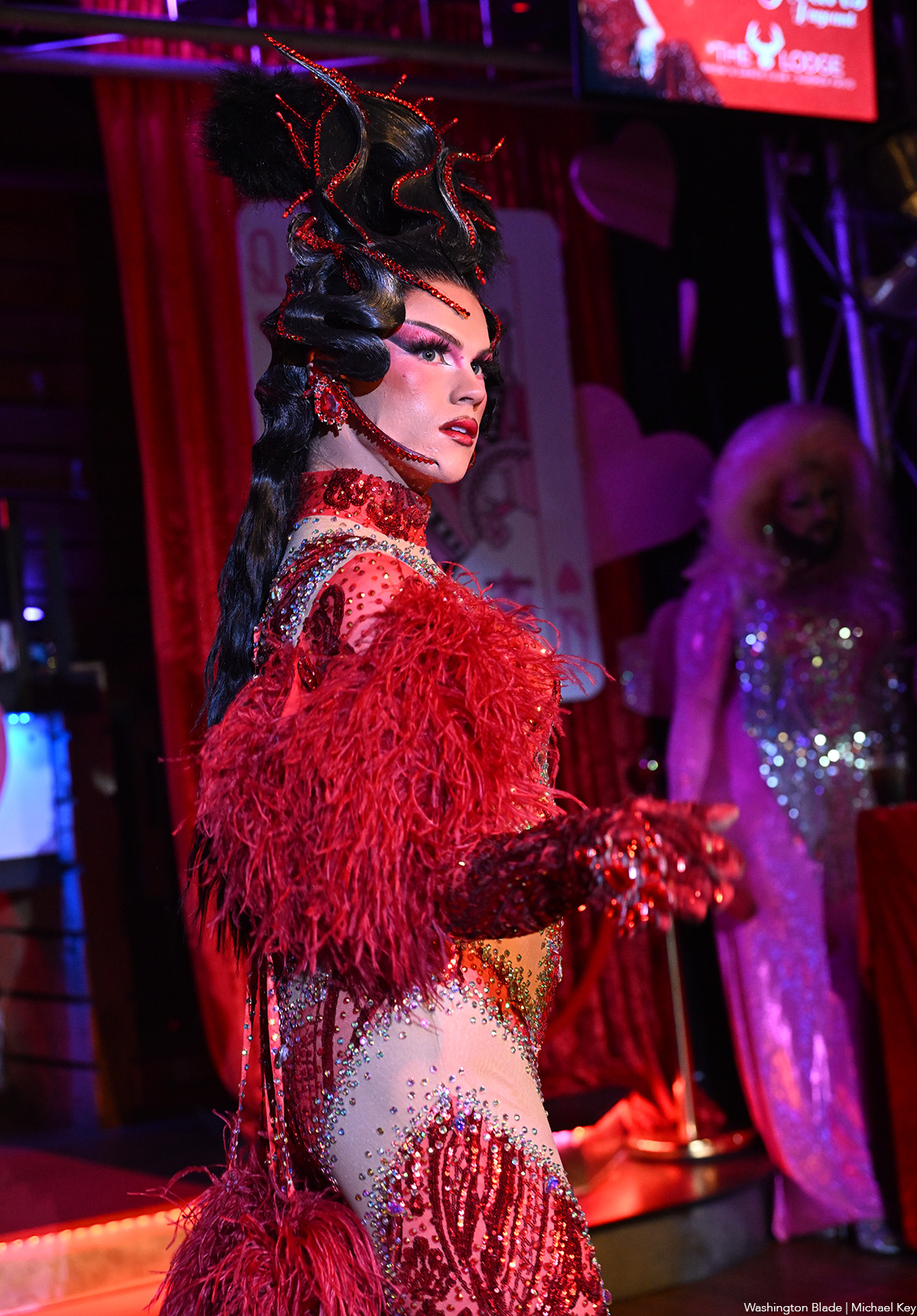
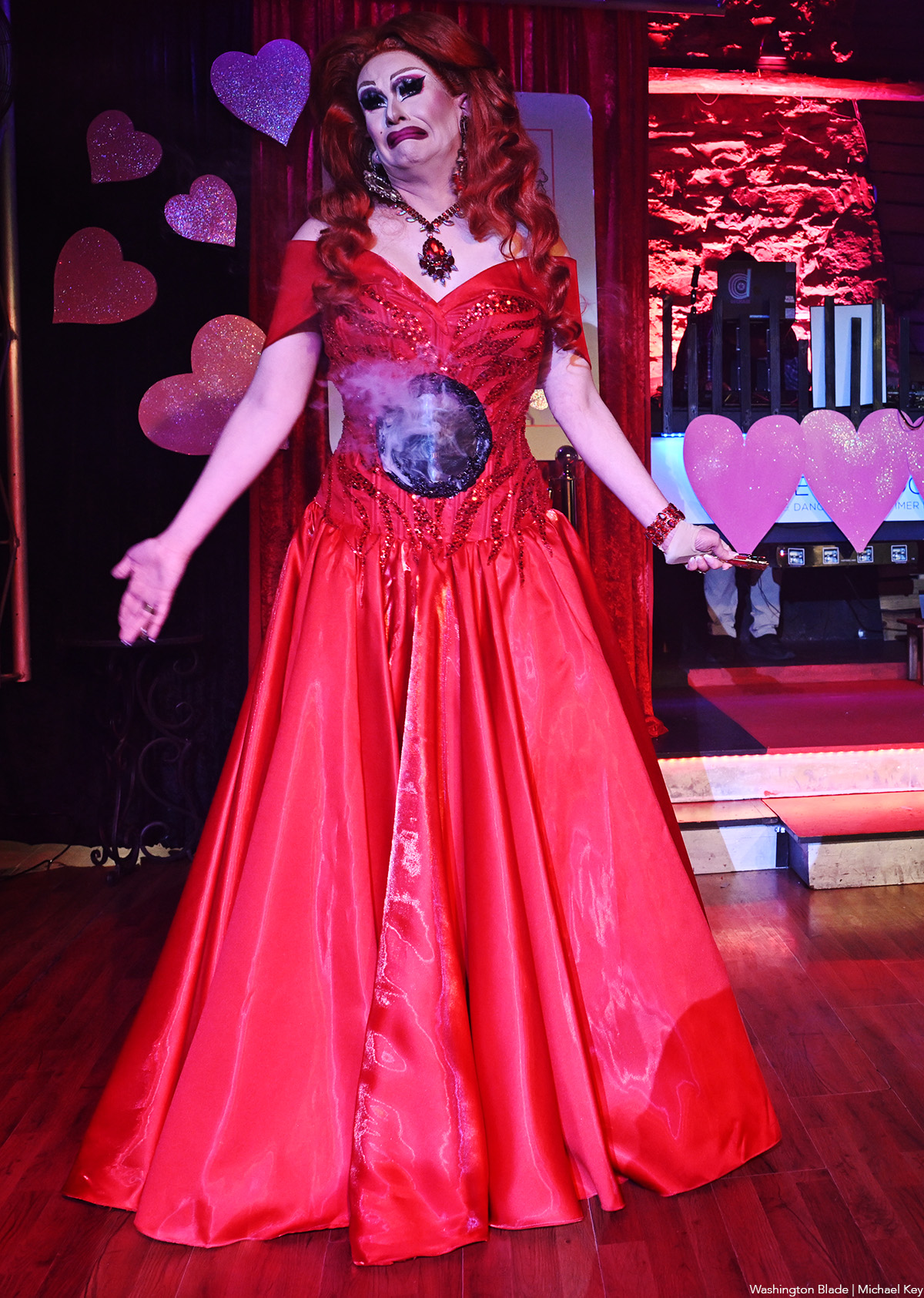
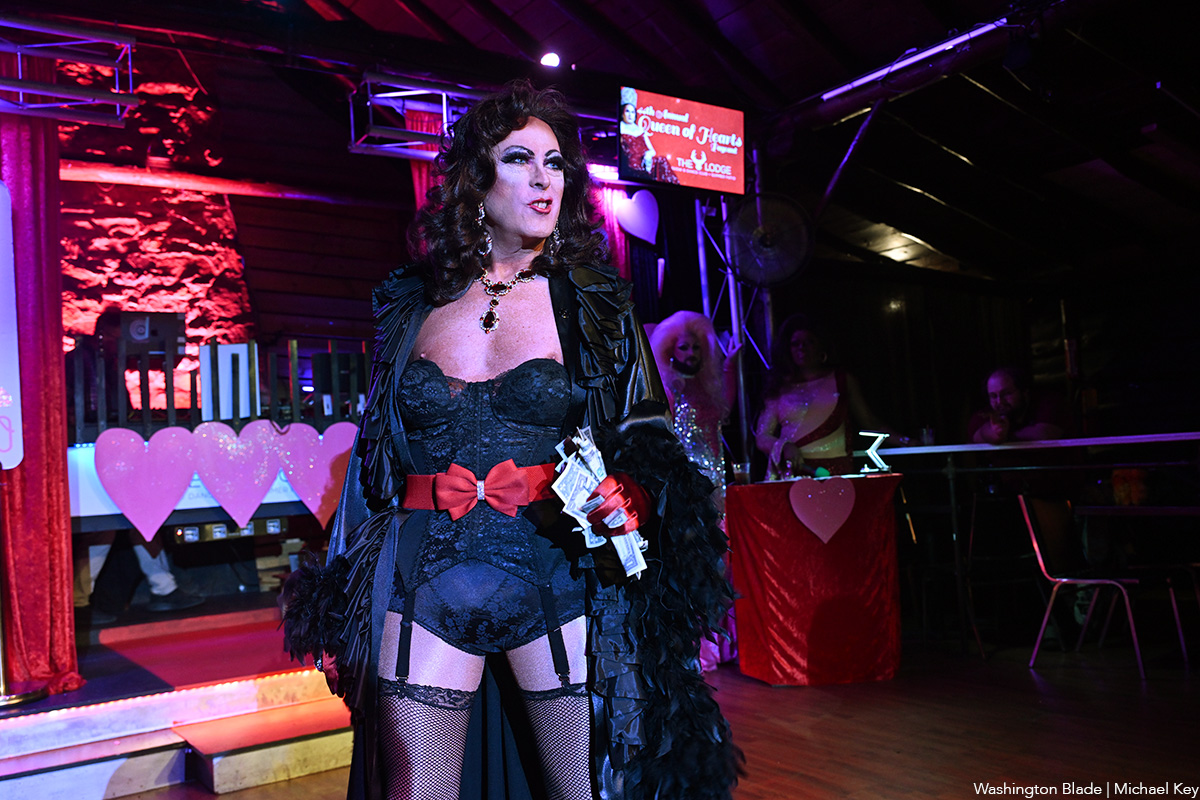
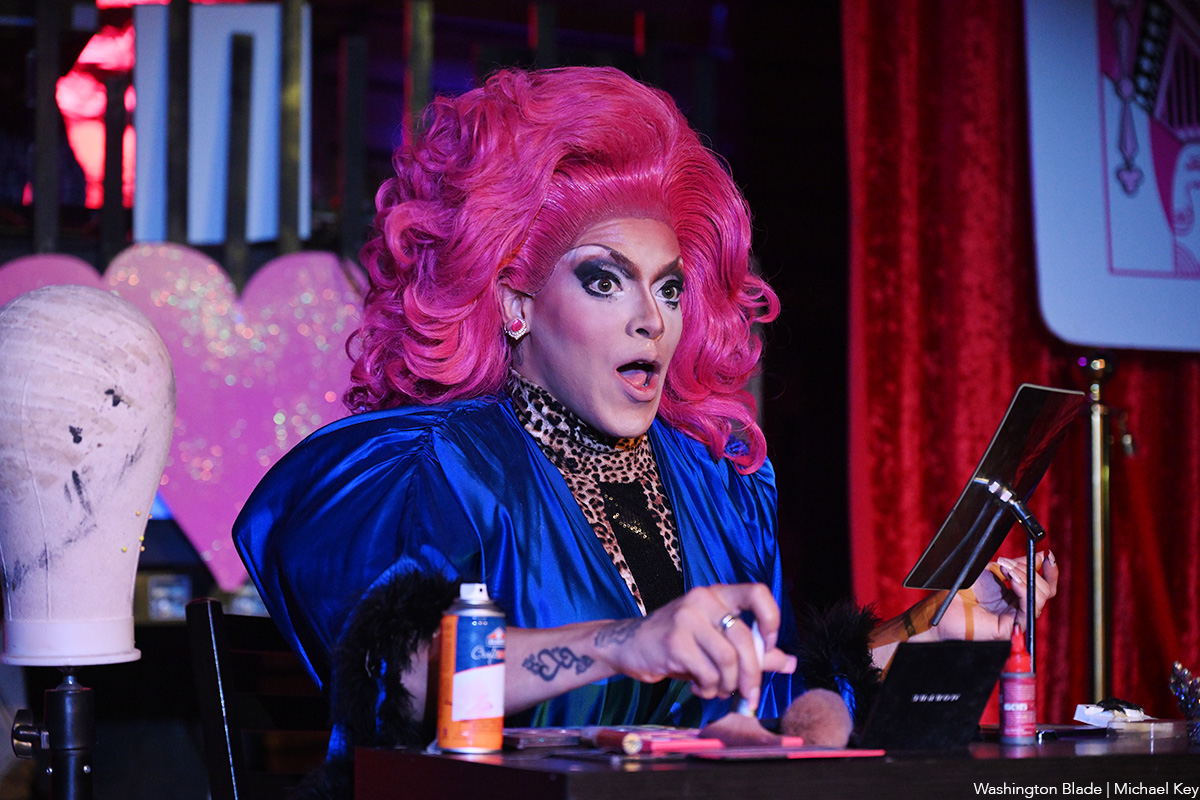
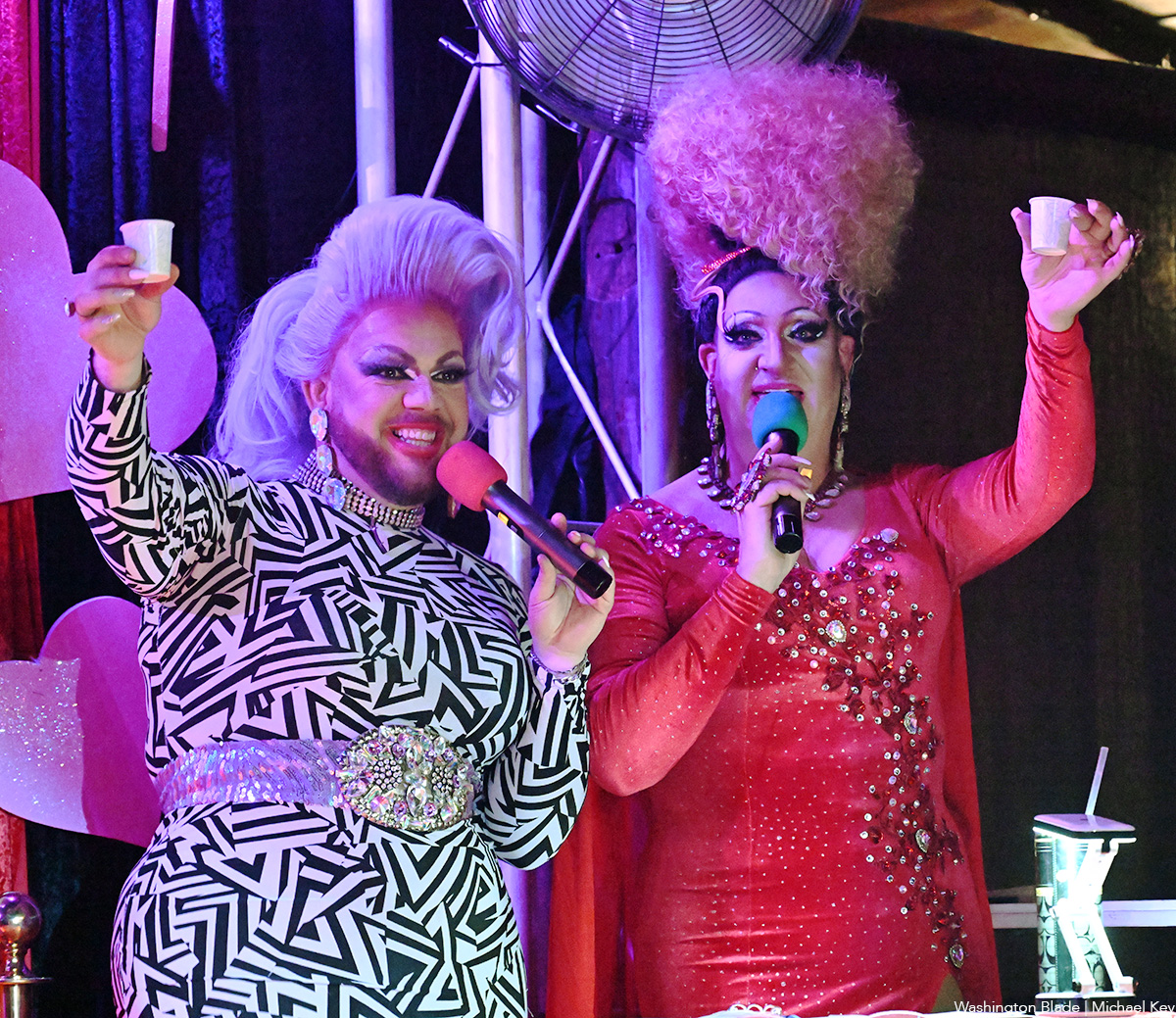
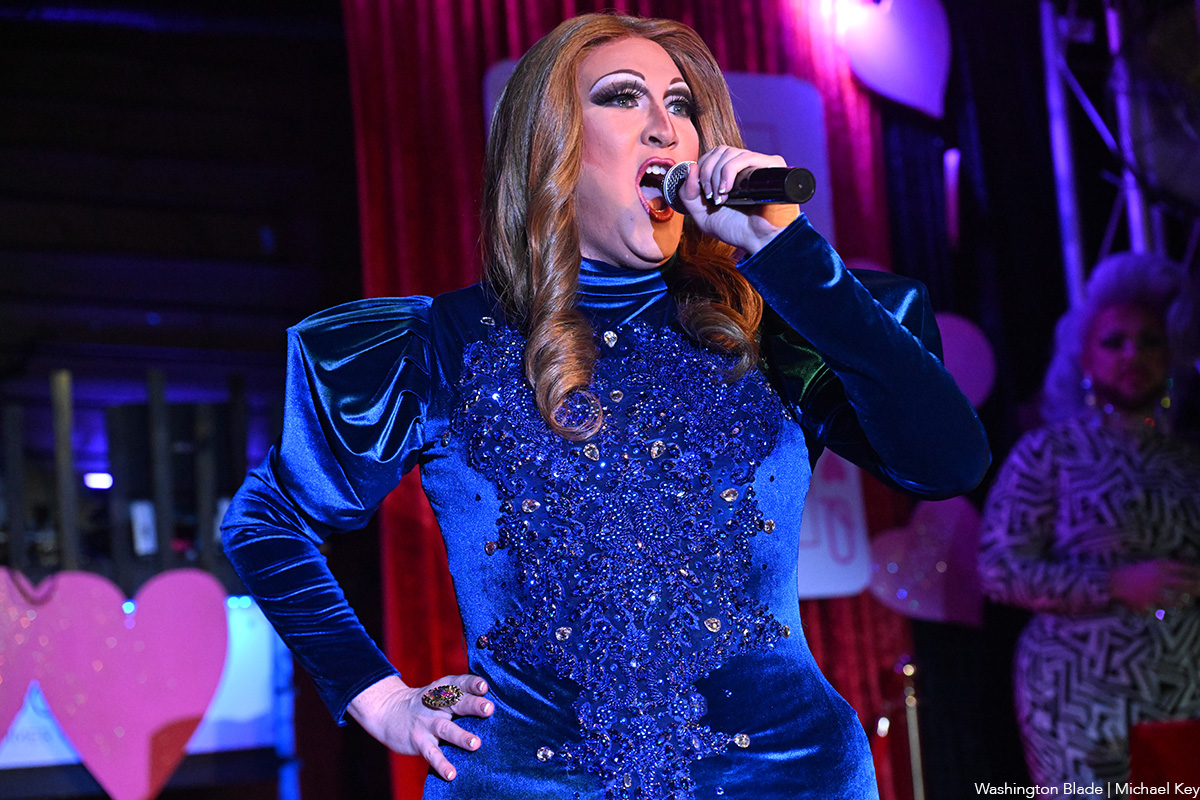
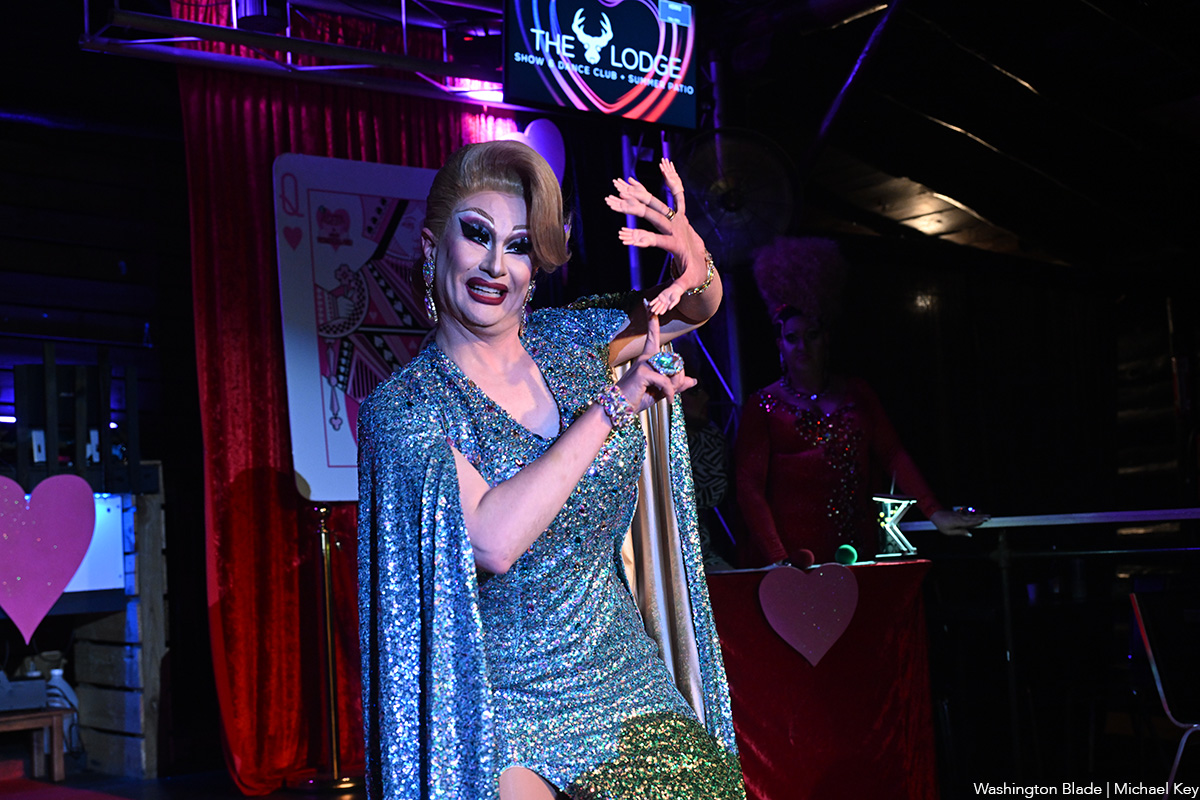
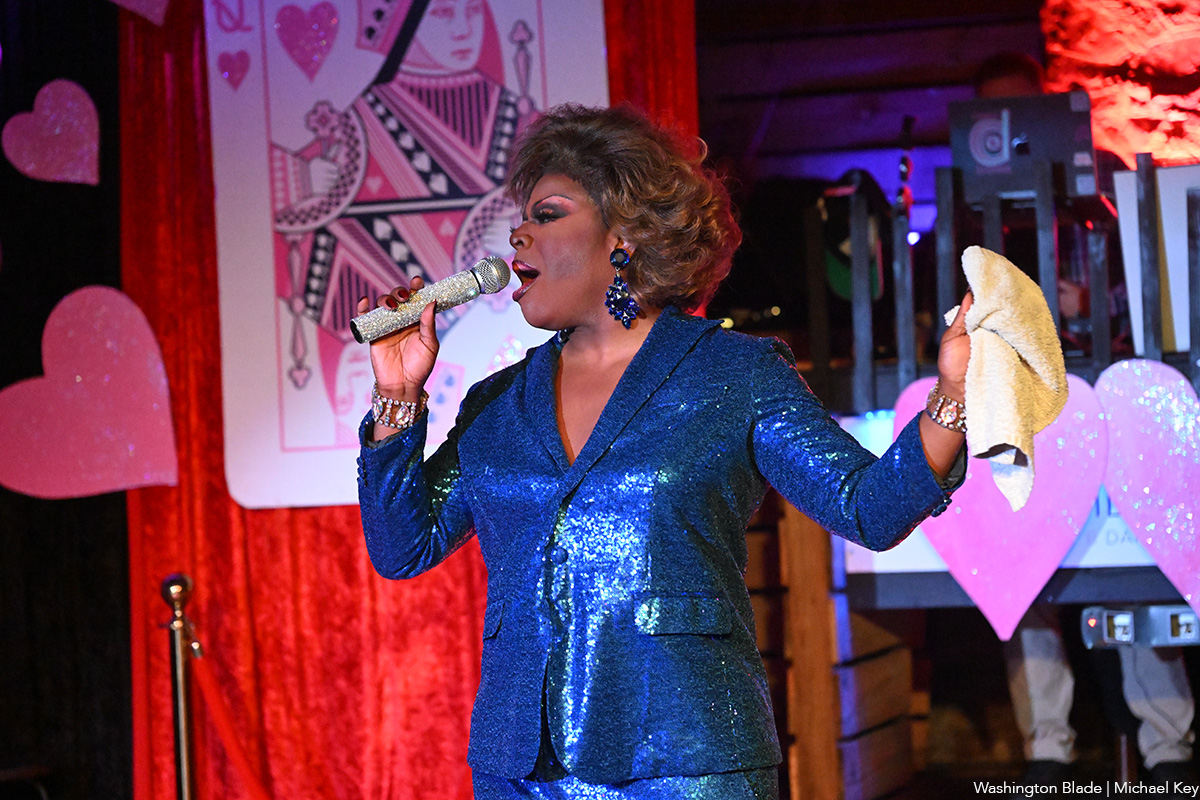
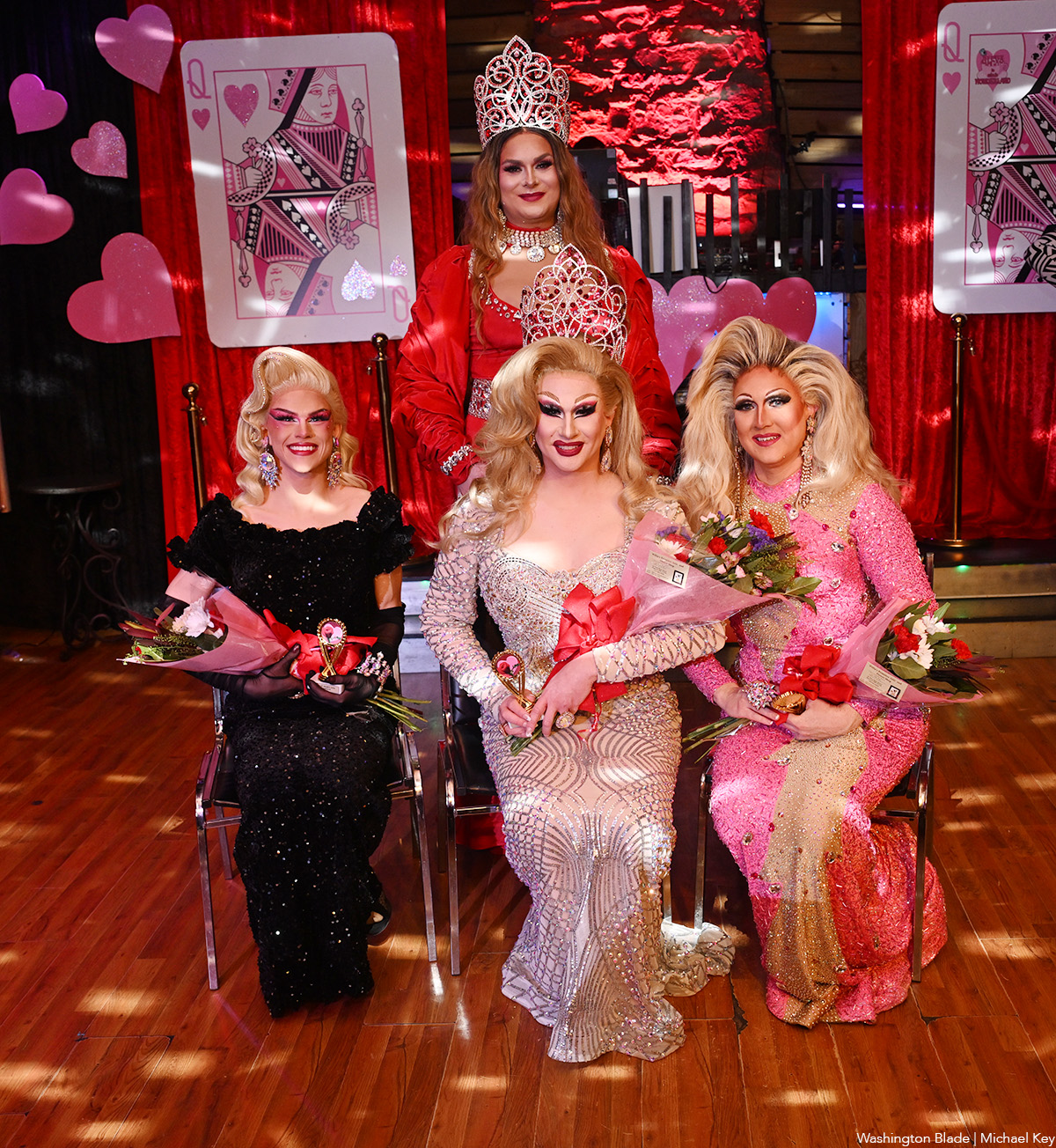
View on Threads
Books
New book profiles LGBTQ Ukrainians, documents war experiences
Tuesday marks four years since Russia attacked Ukraine

Journalist J. Lester Feder’s new book profiles LGBTQ Ukrainians and their experiences during Russia’s war against their country.
Feder for “The Queer Face of War: Portraits and Stories from Ukraine” interviewed and photographed LGBTQ Ukrainians in Kyiv, the country’s capital, and in other cities. They include Olena Hloba, the co-founder of Tergo, a support group for parents and friends of LGBTQ Ukrainians, who fled her home in the Kyiv suburb of Bucha shortly after Russia launched its war on Feb. 24, 2022.
Russian soldiers killed civilians as they withdrew from Bucha. Videos and photographs that emerged from the Kyiv suburb showed dead bodies with their hands tied behind their back and other signs of torture.

Olena Shevchenko, chair of Insight, a Ukrainian LGBTQ rights group, wrote the book’s forward.

The book also profiles Viktor Pylypenko, a gay man who the Ukrainian military assigned to the 72nd Mechanized Black Cossack Brigade after the war began. Feder writes Pylypenko’s unit “was deployed to some of the fiercest and most important battles of the war.”
“The brigade was pivotal to beating Russian forces back from Kyiv in their initial attempt to take the capital, helping them liberate territory near Kharkiv and defending the front lines in Donbas,” wrote Feder.
Pylypenko spent two years fighting “on Ukraine’s most dangerous battlefields, serving primarily as a medic.”
“At times he felt he was living in a horror movie, watching tank shells tear his fellow soldiers apart before his eyes,” wrote Feder. “He held many men as they took their final breaths. Of the roughly one hundred who entered the unit with him, only six remained when he was discharged in 2024. He didn’t leave by choice: he went home to take care of his father, who had suffered a stroke.”
Feder notes one of Pylypenko’s former commanders attacked him online when he came out. Pylypenko said another commander defended him.
Feder also profiled Diana and Oleksii Polukhin, two residents of Kherson, a port city in southern Ukraine that is near the mouth of the Dnieper River.
Ukrainian forces regained control of Kherson in November 2022, nine months after Russia occupied it.
Diana, a cigarette vender, and Polukhin told Feder that Russian forces demanded they disclose the names of other LGBTQ Ukrainians in Kherson. Russian forces also tortured Diana and Polukhin while in their custody.
Polukhim is the first LGBTQ victim of Russian persecution to report their case to Ukrainian prosecutors.

Feder, who is of Ukrainian descent, first visited Ukraine in 2013 when he wrote for BuzzFeed.
He was Outright International’s Senior Fellow for Emergency Research from 2021-2023. Feder last traveled to Ukraine in December 2024.
Feder spoke about his book at Politics and Prose at the Wharf in Southwest D.C. on Feb. 6. The Washington Blade spoke with Feder on Feb. 20.
Feder told the Blade he began to work on the book when he was at Outright International and working with humanitarian groups on how to better serve LGBTQ Ukrainians. Feder said military service requirements, a lack of access to hormone therapy and documents that accurately reflect a person’s gender identity and LGBTQ-friendly shelters are among the myriad challenges that LGBTQ Ukrainians have faced since the war began.
“All of these were components of a queer experience of war that was not well documented, and we had never seen in one place, especially with photos,” he told the Blade. “I felt really called to do that, not only because of what was happening in Ukraine, but also as a way to bring to the surface issues that we’d had seen in Iraq and Syria and Afghanistan.”

Feder also spoke with the Blade about the war’s geopolitical implications.
Russian President Vladimir Putin in 2013 signed a law that bans the “promotion of homosexuality” to minors.
The 2014 Winter Olympics took place in Sochi, a Russian resort city on the Black Sea. Russia annexed Crimea from Ukraine a few weeks after the games ended.
Russia’s anti-LGBTQ crackdown has continued over the last decade.
The Russian Supreme Court in 2023 ruled the “international LGBT movement” is an extremist organization and banned it. The Russian Justice Ministry last month designated ILGA World, a global LGBTQ and intersex rights group, as an “undesirable” organization.
Ukraine, meanwhile, has sought to align itself with Europe.
Ukrainian President Volodymyr Zelenskyy after a 2021 meeting with then-President Joe Biden at the White House said his country would continue to fight discrimination based on sexual orientation and gender identity. (Zelenskyy’s relationship with the U.S. has grown more tense since the Trump-Vance administration took office.) Zelenskyy in 2022 publicly backed civil partnerships for same-sex couples.
Then-Ukrainian Ambassador to the U.S. Oksana Markarova in 2023 applauded Kyiv Pride and other LGBTQ and intersex rights groups in her country when she spoke at a photo exhibit at Ukraine House in D.C. that highlighted LGBTQ and intersex soldiers. Then-Kyiv Pride Executive Director Lenny Emson, who Feder profiles in his book, was among those who attended the event.
“Thank you for everything you do in Kyiv, and thank you for everything that you do in order to fight the discrimination that still is somewhere in Ukraine,” said Markarova. “Not everything is perfect yet, but you know, I think we are moving in the right direction. And we together will not only fight the external enemy, but also will see equality.”
Feder in response to the Blade’s question about why he decided to write his book said he “didn’t feel” the “significance of Russia’s war against Ukraine” for LGBTQ people around the world “was fully understood.”
“This was an opportunity to tell that big story,” he said.
“The crackdown on LGBT rights inside Russia was essentially a laboratory for a strategy of attacking democratic values by attacking queer rights and it was one as Ukraine was getting closet to Europe back in 2013, 2014,” he added. “It was a strategy they were using as part of their foreign policy, and it was one they were using not only in Ukraine over the past decade, but around the world.”
Feder said Republicans are using “that same strategy to attack queer people, to attack democracy itself.”
“I felt like it was important that Americans understand that history,” he said.

More than a dozen LGBTQ athletes won medals at the Milan Cortina Winter Olympics that ended on Sunday.
Cayla Barnes, Hilary Knight, and Alex Carpenter are LGBTQ members of the U.S. women’s hockey team that won a gold medal after they defeated Canada in overtime. Knight the day before the Feb. 19 match proposed to her girlfriend, Brittany Bowe, an Olympic speed skater.
French ice dancer Guillaume Cizeron, who is gay, and his partner Laurence Fournier Beaudry won gold. American alpine skier Breezy Johnson, who is bisexual, won gold in the women’s downhill. Amber Glenn, who identifies as bisexual and pansexual, was part of the American figure skating team that won gold in the team event.
Swiss freestyle skier Mathilde Gremaud, who is in a relationship with Vali Höll, an Austrian mountain biker, won gold in women’s freeski slopestyle.
Bruce Mouat, who is the captain of the British curling team that won a silver medal, is gay. Six members of the Canadian women’s hockey team — Emily Clark, Erin Ambrose, Emerance Maschmeyer, Brianne Jenner, Laura Stacey, and Marie-Philip Poulin — that won silver are LGBTQ.
Swedish freestyle skier Sandra Naeslund, who is a lesbian, won a bronze medal in ski cross.
Belgian speed skater Tineke den Dulk, who is bisexual, was part of her country’s mixed 2000-meter relay that won bronze. Canadian ice dancer Paul Poirier, who is gay, and his partner, Piper Gilles, won bronze.
Laura Zimmermann, who is queer, is a member of the Swiss women’s hockey team that won bronze when they defeated Sweden.
Outsports.com notes all of the LGBTQ Olympians who competed at the games and who medaled.

